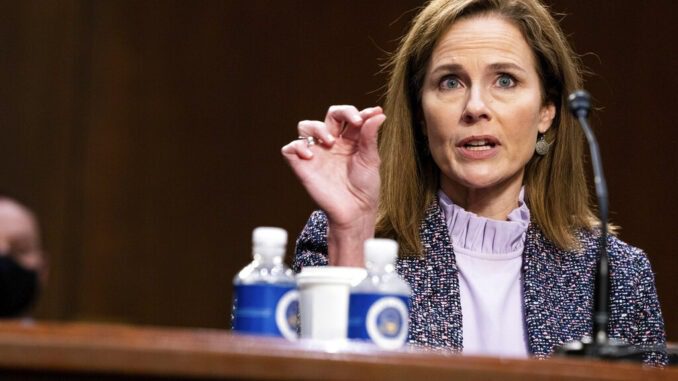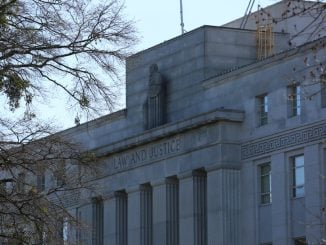
WASHINGTON, D.C. — Republicans powered Supreme Court nominee Amy Coney Barrett closer to confirmation Thursday, pushing past Democratic objections in the process to seat President Donald Trump’s pick before the Nov. 3 election.
The Senate Judiciary Committee set Oct. 22 for its vote to recommend Barrett’s nomination to the full Senate, with a final confirmation vote expected by month’s end.
“A sham,” said Sen. Amy Klobuchar, D-Minn. “Power grab,” protested Sen. Richard Blumenthal, D-Conn. “Not normal,” said Sen. Dick Durbin, D-Ill.
Republicans eager to fill the seat of the late Justice Ruth Bader Ginsberg countered that Trump is well within bounds to fill the vacancy, and they have the votes to do it.
Sen. John Cornyn, R-Texas, said he understands Democrats’ “disappointment.” He said, “Their loss is the American people’s gain.”
Barrett’s confirmation would bring the most pronounced ideological change on the court in 30 years, from the liberal Ginsberg to the conservative appeals court judge from Indiana. The shift is poised to launch a new era of court rulings on abortion, voting rights and other matters that are now open to new uncertainty.
The 48-year-old Barrett was careful during two days of public testimony not to tip her views on many issues, or take on the president who nominated her. Facing almost 20 hours of questions from senators, she declined to offer specifics beyond a vow to keep an open mind and take the cases as they come.
“It’s not the law of Amy,” the mother of seven told the senators.
Barrett wasn’t present for Thursday’s hearing, the last of the week’s sessions.
Stakes are high for all sides. Liberals pounced when top Democrat Sen. Dianne Feinstein of California hugged the chairman, Sen. Lindsey Graham, R-S.C., as days of hearings closed, praising his handling of the process. They called for her immediate removal from leadership.
Among those testifying Thursday in support of Barrett’s nomination, retired appellate court Judge Thomas Griffith assured senators that Barrett would be among justices who “can and do put aside party and politics.”
A former Notre Dame Law School professor, Barrett would be the only one of her Supreme Court colleagues not groomed in the Ivy League.
At the high court, she may be quickly called on, if confirmed, to consider the GOP-backed challenge to the Affordable Care Act in a case coming before the court Nov. 10, as well as any election-related challenges between Trump and Democrat Joe Biden in the heated presidential campaign.
“Amy’s doing a fantastic job,” Trump said at the White House before heading out to a Wednesday night campaign rally.
Trump has publicly stated he wants a justice swiftly seated for both situations. The president has said on Twitter he wants a justice who would rule differently than Chief Justice John Roberts, who helped preserve the law in previous cases. And he said he wants a justice in place for any disputes arising from the election, particularly concerning the surge of mail-in ballots expected during the pandemic.
Barrett declined to disclose views on those matters, and many others, as nominees typically resist offering any more information than they have to.
Republicans focused intently on her Catholic faith and what Graham called Barrett’s “unashamedly pro-life” views as a role model for conservative women.
Others testifying Thursday included Laura Wolk, the first blind woman to be a law clerk for the Supreme Court, who told senators that Barrett’s encouragement and support were life-changing.
“Her brilliance is matched only by her compassion,” said Wolk, who also spent a year as a law clerk for Barrett.



